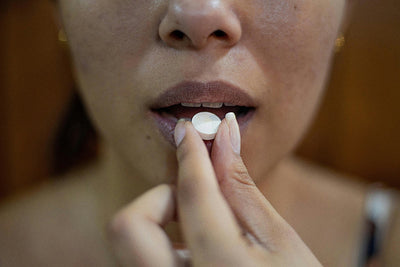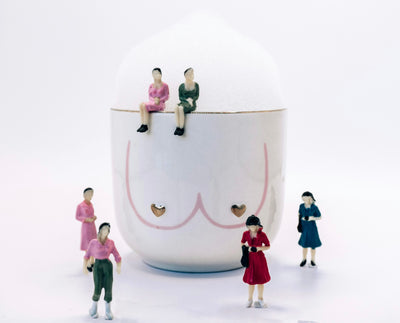A Quick Guide to Diet and Nutrition While Breastfeeding
A Quick Guide to Diet and Nutrition While Breastfeeding
by Nida Choudary
There’s a lot of conflicting information on breastfeeding out there, and it can create more questions than answers. The last thing a new mother needs is confusion over nutrition so we've gone through the research and compiled some of it in this simple guide.
The body’s ability to produce enough healthy milk for children is remarkable. Even if you’re consuming a diet low in nutrients your body will make every effort to provide what your child needs. However, this in turn can deplete a mom's own stores and take a toll on her health. Breastfeeding puts extra demand on your body and means it needs extra care. This post aims to help explain the following:
- how a mother’s nutrition changes when she’s lactating
- how those changes affect the makeup and quantity of her milk
- what you can do to improve your nutrition and, in turn, your child’s
What’s happening in your body?
Part of the lactation process relies on what your body is storing. Studies show different results about weight loss during lactation. While most women lose some fat in the first 6 months after giving birth, the lean-body mass of healthy women (the weight of everything else besides fat) stays the same.
The amount of minerals in your bones decreases with lactation, regardless of how healthy you are. Fortunately this loss does not mean you are more prone to breaking bones. It’s temporary and you’ll regain the minerals when you wean your baby off breast milk and your period starts again.
What are the effects on milk?
You will make more milk in the days after birth and less once your baby starts weaning. The exact amount varies among women, especially for those who give birth to twins.
The biggest factor in determining how much you are making is how much your baby needs, not how much you can make. Your body will produce the right amount whether your baby is healthy or has a disorder that requires more milk. As they start to consume solid foods, babies will demand less milk and you will make less.The body typically knows what it’s doing.
Small changes in your diet and efforts to lose or gain weight will not affect how much you lactate. The milk is affected only in extreme cases of malnutrition.
How do you improve nutrition?
- For vegetarian mothers there is the potential for mineral, protein, and vitamin deficiencies. Depending on how strict the diet is, calcium, vitamin D, and vitamin B12 supplements may be needed.
- Vegan mothers, (those who don’t consume any animal products), need to take a vitamin B12 supplement which is easily found in most multivitamins.
Here’s an extra mini guide for vegan moms.
- If a lactating woman is fasting for a short time, her milk supply will not decrease, but its makeup can change. With longer days of fasting, there is a greater risk of it negatively affecting your nutrition. Breastfeeding women may be exempt from fasting during religious occasions like Ramadan for this reason.
Breastfeeding means you need more nutrition and energy from your diet. Having a continuously bad diet lacking in basic nutrients might eventually catch up with the quality of your milk.
Women that keep up a balanced diet can get the extra nutrition required by simply eating more, but it might be beneficial to add supplements as well. How many calories you need on a daily basis depends on your age, weight, height, and how physically active you are. Overall, lactating mothers need to focus on consuming more proteins, vitamins A, B, C, and E, and minerals like calcium, phosphorus, magnesium, iron, iodine, zinc, and selenium.
Fish and shellfish can be particularly helpful in providing some of these nutrients. They contain omega-3s (long-chain polyunsaturated fatty acids) and studies show they benefit the baby’s brain development.
Here some things you should limit or avoid while breastfeeding:
- Alcohol: Small amounts of alcohol do enter breast milk and how much is okay to consume is not agreed upon by experts. Most suggest you should wait to breastfeed for at least 2 hours after a single serving of alcohol, adding 2 hours for each additional serving. You do not need to get rid of your milk after having a drink unless your breasts are too swollen or uncomfortable. In general, it’s best to avoid alcohol as it can affect your abilities to care for your child.
- Fish with high amounts of mercury: Beware of mercury as it can disrupt your baby’s development. You should only be eating 8 to 12 ounces a week of fish; that’s about 2 average servings. This includes light tuna found in cans, albacore, salmon, pollock, and shrimp. Avoid shark, swordfish, king mackerel, or tilefish. You can also check notices about the mercury levels of your local fish.
- Stress, anxiety, fatigue, illness, and smoking can lead to insufficient amounts of milk being produced. With all the ups and downs of motherhood it can be particularly hard to cope with these issues. Here are some ways to help manage stress.
And some things up to mother’s discretion:
- Caffeine: Most women can drink a normal amount of caffeine (2-3 cups) and not harm their baby when breastfeeding, but some babies are sensitive and become irritable and have a hard time sleeping. You also don’t have to sacrifice your treats altogether, but it may help to limit them. Here is a breakdown of some favorite caffeinated drinks.
- Nonnutritive sweeteners: Things like Saccharin, sucralose, and acesulfame potassium are found in small amounts in breast milk and ingesting them does not have negative effects. However, some experts suggest not consuming them in excess.
- Oral contraceptives: In most cases, there is no effect on how much milk a mother makes, however you may want to avoid pills containing estrogen as they sometimes alter milk production. It is best to discuss this with your healthcare provider to find the right option for you.
Besides being aware of the above, there are very few foods that are forbidden to lactating mothers. Even foods like unpasteurized dairy products and undercooked meat have not shown to have any extra health risks. Avoiding foods while breastfeeding to prevent allergies is not necessary as most evidence shows this is ineffective.
You may also want to talk to a qualified consultant who will work with you to figure out your best breastfeeding diet.
Planning a proper diet that meets you and your baby’s physical needs leads to invaluable peace of mind during this exciting yet scary stage of life.
References
Butte, Nancy F, and Stuebe, Alison. “Maternal nutrition during lactation.” UpToDate, August 2020, https://www.uptodate.com/contents/maternal-nutrition-during-lactation/print?search=breast.
Image source: https://unsplash.com/photos/phEaeqe555M






